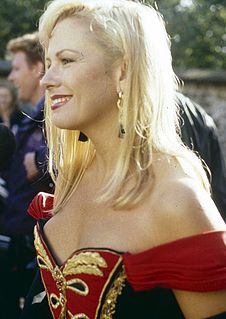A Quote by Pamela Stephenson
The notion of a contemporary epiphany to me is very exciting, because it's a sort of biblical thing. It's something that has happened to people in other centuries or in the context of religious experience.
Related Quotes
It's a funny thing when you think you're dead. You're not terrified of it anymore. There's a sort of a epiphany to religious thing; it's not sort of church-based, but you end up with a serenity which you didn't have before, and I just simply enjoy it. It really does sound stupid, but I've got to tell you it's made my life.
A text makes the word more specific. It really kind of defines it within the context in which it is being used. If it is just taken out of a context and presented as a sort of object, which is what - you know, which is a contemporary art idea, you know. It is like an old surrealist idea or an old cubist idea to take something out of context and put it in a completely different context. And it sort of gives it a different meaning and creates another world, another kind of world in which we enter.
Sometimes I do feel exposed. I have this kind of theory about different channels or levels of relaying experience - when I tell someone, one on one, in a personal context, about something that's happened to me - that has a very different valence, a different charge, than when/if I've said it in a public forum.
Archaeology in general is the recovery and study of the material culture of past civilizations. Biblical archaeology is as an application of the science of archaeology to the field of biblical studies. Through the comparison and integration of Scripture with the evidence of history and culture derived from archaeology, new insights into the biblical context of people and events, and sometimes the interpretation of the text itself, are possible. In this way archaeology serves as a necessary tool for biblical exegesis and for apologetic concerns.
When you start, it's very cold, an impossible task. But then maybe the characters start to take on a little bit of life, or the story takes a turn that you don't expect ... With me that happens a lot because I don't outline, I just have a vague notion. So it's always felt like less of a made thing and more of a found thing. That's exciting. That's a thrill.
A lot of people around the world were, like, very frustrated, you know "Why don't you just release the name? Why is it taking so long?" But the cool thing is that it brought people together, like you said, it brought our fans into the experience, it sort of exposed us, exposed the process, and I think it welcomed Mike Magini, because people saw what happened to get to that point.
"Biblical theology" refers to something more precise than theology that is faithful to the Bible. It might be helpful to draw a contrast: at the risk of oversimplification, systematic theology tends to organize theology topically and with an eye cast on its contemporary relevance, while biblical theology tends to organize the same biblical material so that it is easier to see the distinctive contribution of each biblical book and human author, and to trace the trajectories of themes across the Bible so we see how the books of the Bible hold together.



































